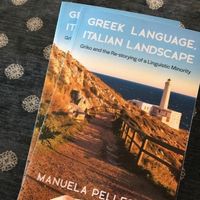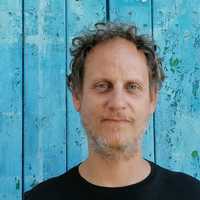
Manuela Pellegrino
I hold a PhD in Anthropology from University College of London. Since 2006, my research among
Griko speakers and activists in Grecìa Salentina (Apulia) and supporters in Greece has formed the
basis of my publications, culminating in my monograph Greek Language, Italian Landscape: Griko
and the Re-storying of a Linguistic Minority. I currently collaborate with the University of Southern
Denmark and I currently am a Lewis-Gibson Visiting Fellow at the CCGS, University of Cambridge (fall 2024). I previously was a Fellow at the Centre for Hellenic Studies, Harvard University, at the
Smithsonian Institution and I lectured in anthropology at Brunel University London. I also compose polyphonic poems in Griko as a method of writing ethnographically about the past and present of this language: As the grand-daughter/daughter of Griko-speakers my research reflects a longstanding interest and represents my personal form of activism.
Griko speakers and activists in Grecìa Salentina (Apulia) and supporters in Greece has formed the
basis of my publications, culminating in my monograph Greek Language, Italian Landscape: Griko
and the Re-storying of a Linguistic Minority. I currently collaborate with the University of Southern
Denmark and I currently am a Lewis-Gibson Visiting Fellow at the CCGS, University of Cambridge (fall 2024). I previously was a Fellow at the Centre for Hellenic Studies, Harvard University, at the
Smithsonian Institution and I lectured in anthropology at Brunel University London. I also compose polyphonic poems in Griko as a method of writing ethnographically about the past and present of this language: As the grand-daughter/daughter of Griko-speakers my research reflects a longstanding interest and represents my personal form of activism.
less
Related Authors
Giulia Leccese
University of Trento
Claudio Marrucci
Universidad Complutense de Madrid
Andrea Pelliccia
Consiglio Nazionale delle Ricerche (CNR)
Rigas Raftopoulos
Università degli studi Roma Tre
InterestsView All (6)









Uploads
Papers by Manuela Pellegrino
http://siba-ese.unisalento.it/index.php/palaver/article/view/15778
Talks by Manuela Pellegrino
Online Book presentation
Online Open House, Center for Hellenic Studies, Washington, DC
The co-presence of the Griko and the local romance dialect (Salentine) has produced over time multiple phenomena worthy of attention that concerns both the use and structure of Griko. These phenomena had and have important repercussions on the community’s self-perception and representation as well as the future envisaged for the language. In this talk, I address the Griko-Salentine bilingualism from the turn of the 20th century to the present day by discussing the use of Griko as a 'secret code' and more generally as a resource. I also examine the debates that its hybrid character, owing to the influence of Salentine, provoke among Griko activists, local cultori del Griko and speakers alike. This analysis will help me to highlight the interaction and tension between language ideologies from the past and the present and the unexpected effects that they generate.
Event: La diglossia nell'area ellenofona di Terra d'Otranto,
promoted by the Municipality of Zollino; in collaboration with the Center for the historical-linguistic minorities of Apulia, University of Salento (regional Law n.5/2012)
Location: Auditorium Tondi, Zollino,
Event day: Saturday, Wednesday, 4th of May, 2019
The formation of neologisms and the topic of linguistic recovery of forgotten terms in Griko often animate debates among activists that even reach out to the speakers. In this talk, I present two initiatives promoted by cultural associations that serve to illustrate how the notion of the 'authenticity' of Griko is contested and may function to divide Griko activists, cultori del Griko and speakers alike into two main competing camps: 1) The 'purists' who define Griko's authenticity relative to its distance from the romance dialect (Salentine) and Italian; 2) The 'compromisers/accomodators' who define its authenticity in terms of 'spontaneous, real speech situations,' which, for historical reasons, present hybrid forms that mix Griko with Salentine and Italian. Such “language ideological debates” (Blommaert 1999) give us insights into the future envisioned for Griko.
Location: “G. Rohlfs” Museum – Bova, Italy
Fantastic Languages and where to find them. H2020 COLING
Event day: Tuesday, 16th of April , 2019
Michael Herzfeld and Manuela Pellegrino will discuss their recent fieldwork in Greece and Italy, and reflect on the challenges of anthropological writing as activism. Participant observation remains the cornerstone of anthropology, while ethnographers practice "observant participation" and actively engage with the very topics they intend to investigate. Herzfeld and Pellegrino will consider longstanding concerns about the objectivity of anthropological studies, and ethical questions about "giving voice," advocacy, and the need to recognize the inherent ideological dimension of anthropological work.
Center for Hellenic Studies – Harvard University, Washington DC
Friday, October 18 2019
6:00pm
https://chs.harvard.edu/CHS/article/display/6978
In this talk I take a language ideological approach to the history of Griko language activism, a language of Greek origins used in the southern Italian Province of Lecce (Grecìa Salentina); based on fieldwork conducted in Greece I focus in particular on the initiatives in its support promoted by Greek aficionados of Griko. By painting a picture of Grecìa Salentina and Griko drowned by my Greek interlocutors I investigate the extent to which the inscribed 'cultural ideology of Hellenism' and of historical continuity has filtered their views and shaped their gaze on Griko. I also discuss how their engagement with Griko has contributed to the reproduction and circulation in Grecìa Salentina of a language ideology which celebrates Griko as a " living monument of Hellenism " , " ena zondanó mnimeío tou Ellinismoú ". The ongoing contacts among Greek and Italian aficionados of Griko ultimately highlight the performative effects of metalanguage and the effectiveness of language ideologies linked to specific historicities to reinforce cultural ties between contemporary Italy and Greece, connecting communities across national borders.
http://siba-ese.unisalento.it/index.php/palaver/article/view/15778
Online Book presentation
Online Open House, Center for Hellenic Studies, Washington, DC
The co-presence of the Griko and the local romance dialect (Salentine) has produced over time multiple phenomena worthy of attention that concerns both the use and structure of Griko. These phenomena had and have important repercussions on the community’s self-perception and representation as well as the future envisaged for the language. In this talk, I address the Griko-Salentine bilingualism from the turn of the 20th century to the present day by discussing the use of Griko as a 'secret code' and more generally as a resource. I also examine the debates that its hybrid character, owing to the influence of Salentine, provoke among Griko activists, local cultori del Griko and speakers alike. This analysis will help me to highlight the interaction and tension between language ideologies from the past and the present and the unexpected effects that they generate.
Event: La diglossia nell'area ellenofona di Terra d'Otranto,
promoted by the Municipality of Zollino; in collaboration with the Center for the historical-linguistic minorities of Apulia, University of Salento (regional Law n.5/2012)
Location: Auditorium Tondi, Zollino,
Event day: Saturday, Wednesday, 4th of May, 2019
The formation of neologisms and the topic of linguistic recovery of forgotten terms in Griko often animate debates among activists that even reach out to the speakers. In this talk, I present two initiatives promoted by cultural associations that serve to illustrate how the notion of the 'authenticity' of Griko is contested and may function to divide Griko activists, cultori del Griko and speakers alike into two main competing camps: 1) The 'purists' who define Griko's authenticity relative to its distance from the romance dialect (Salentine) and Italian; 2) The 'compromisers/accomodators' who define its authenticity in terms of 'spontaneous, real speech situations,' which, for historical reasons, present hybrid forms that mix Griko with Salentine and Italian. Such “language ideological debates” (Blommaert 1999) give us insights into the future envisioned for Griko.
Location: “G. Rohlfs” Museum – Bova, Italy
Fantastic Languages and where to find them. H2020 COLING
Event day: Tuesday, 16th of April , 2019
Michael Herzfeld and Manuela Pellegrino will discuss their recent fieldwork in Greece and Italy, and reflect on the challenges of anthropological writing as activism. Participant observation remains the cornerstone of anthropology, while ethnographers practice "observant participation" and actively engage with the very topics they intend to investigate. Herzfeld and Pellegrino will consider longstanding concerns about the objectivity of anthropological studies, and ethical questions about "giving voice," advocacy, and the need to recognize the inherent ideological dimension of anthropological work.
Center for Hellenic Studies – Harvard University, Washington DC
Friday, October 18 2019
6:00pm
https://chs.harvard.edu/CHS/article/display/6978
In this talk I take a language ideological approach to the history of Griko language activism, a language of Greek origins used in the southern Italian Province of Lecce (Grecìa Salentina); based on fieldwork conducted in Greece I focus in particular on the initiatives in its support promoted by Greek aficionados of Griko. By painting a picture of Grecìa Salentina and Griko drowned by my Greek interlocutors I investigate the extent to which the inscribed 'cultural ideology of Hellenism' and of historical continuity has filtered their views and shaped their gaze on Griko. I also discuss how their engagement with Griko has contributed to the reproduction and circulation in Grecìa Salentina of a language ideology which celebrates Griko as a " living monument of Hellenism " , " ena zondanó mnimeío tou Ellinismoú ". The ongoing contacts among Greek and Italian aficionados of Griko ultimately highlight the performative effects of metalanguage and the effectiveness of language ideologies linked to specific historicities to reinforce cultural ties between contemporary Italy and Greece, connecting communities across national borders.
In conformity with the European Charter of Minority Languages, the Italian government passed Law 482 in 1999 recognising Griko, a language of Greek origins used in Southern Italy (Puglia), as one of the twelve minority languages in Italy. This drastically changed the political economy of the language, fostering a broader cultural revival which has increased the popularity of the place and has put what was until recently Italy's finis terrae – land's end – in the spotlight. The aim of the paper is to highlight the effects of the revival on local language practices, ideologies and community self-perception and presentation: these show how Griko has shifted from being considered a 'dying' language to being celebrated as a 'living monument' of Hellenism and an invaluable resource for social and cultural redemption into the future.
Manuela Pellegrino studied Foreign Languages and Literature (BA, University of Salento); she obtained her Masters and PhD in Anthropology from University College of London and is currently lecturing part-time at Brunel University London. She has conducted fieldwork in Italy and Greece and won scholarships, among others, from the Wenner-Gren and IKY Foundations. In her PhD she investigated the politics of revival of Griko, a language of Greek origins used in Southern Italy (Puglia), highlighting the interplay of language ideologies and policies promoted by the EU, Italy and Greece. Her research interests include language ideologies, practices and policies, cultural heritage and Hellenism.
In a special issue dedicated to 'Temporality and Historicity in and through Linguistic Ideology' (2004) linguistic anthropologists Woolard, Blommaert, Cavanaugh, Inoue and Eisenlohr explored how socially inscribed views, perceptions and feelings about a language (i.e. language ideologies) "both produce and are produced by multiple and heterogeneous histories and temporalities" (Irvine 2004: 1). Drawing on these insights and based on my ethnographic data, my proposed paper highlights the multiple temporal and emotional 'textures' of Griko, a 'dying' language used in the Southern Italian province of Lecce, as well as the divergent visions of temporality and affect evoked by Griko-speakers and activists. Through the analysis of the current revival of Griko I show how locals do not share the same phenomenological references about this language, hence their language ideologies of Griko are inscribed in non-homogenous "historicities" (Hirsch and Stewart 2005:262). In particular I draw attention to how the time embedded in and evoked by Griko feels different, depending on the underlying language ideology, which alternatively associates it to the glorious Hellenic past (Griko activists) or to the more recent past of poverty and subalternity of the Italian South (elderly Griko-speakers); this in turn awakes different emotional textures. The current revival, I argue, provides the space where these different temporal and emotional textures meet projecting Griko as an invaluable resource for social and cultural redemption into the future. The language ideology approach provides, therefore, a lens through which the affective dimension of time and the temporal dimension of affect converge and become mutually constitutive of reality.
After the general decline of interest in kinship studies, the role of kinship structure to extend itself over international boundaries has been highlighted in the context of Greek diasporic communities (Voutira 2011, Nitsiakos 2010). Based on my ethnography of the revival of Griko, a language of Greek origins used in the Southern Italian province of Lecce, this paper examines the potential and limits of the language of kinship between Greeks and Italian Griko-speakers, who do not belong to the historical Greek categories of diaspora and " lost homeland ". In particular I draw attention to its dual articulation-linguistic kinship and kinship as language-in the context of Greek tourism in the hellenophonic villages and of collaborations between cultural associations on both shores; this is implemented by the analysis of Greek newspapers' articles dealing with Griko. My data show how despite the limited mutual intelligibility between Greek and Griko, their deep linguistic kinship is selectively highlighted and iconically projected onto the speakers, becoming the 'proof' of historically deep social relations. I highlight therefore the resort of kinship related terms in the dominant Greek discourse to explore the ways in which kinship remains powerful, beyond the Western biologizing assumption of the term itself (Sutton 1997: 429): kinship becomes indeed the very language through which the Hellenic cultural heritage is reclaimed as an idiom of global belonging. The legacy of kinship studies remains therefore central in understanding how contemporary relationships between persons, communities and places in Greece and Southern Italy are shaped.
GREEK LANGUAGE, ITALIAN LANDSCAPE di Manuela Pellegrino (Centre for Hellenic Studies, Harvard University).
L’evento si terrà Giovedì 9 febbraio 2023 alle ore 18.00 nell’Aula Magna “Doro Levi”, in odòs Parthenonos 14.
Programma:
Saluti introduttivi di Carmelo DI NICUOLO (Scuola Archeologica Italiana di Atene)
Presentano:
Manuela PELLEGRINO (Centre for Hellenic Studies, Harvard University)
Christina PETROPOULOU (Università Panteion)
L'evento sarà coordinato da Carmelo DI NICUOLO (SAIA)
Seguirà un rinfresco.
Η Ιταλική Αρχαιολογική Σχολή Αθηνών με ιδιαίτερη χαρά σας προσκαλεί στην παρουσίαση του βιβλίου GREEK LANGUAGE, ITALIAN LANDSCAPE, της Manuela Pellegrino (Centre for Hellenic Studies, Harvard University).
Η εκδήλωση θα πραγματοποιηθεί την Πέμτη 9 Φεβορυαρίου 2023 στις 7 μ.μ. στην Αίθουσα Εκδηλώσεων "Doro Levi", οδός Παρθενώνος 14.
Πρόγραμμα:
Εισαγωγή του Carmelo DI NICUOLO (Ιταλική Αρχαιολογική Σχολή Αθηνών)
Ομιλητές:
Manuela PELLEGRINO (Centre for Hellenic Studies, Harvard University)
Christina PETROPOULOU (Πάντειον Πανεπιστήμιο)
με συντονιστή τον Carmelo DI NICUOLO (Ιταλική Αρχαιολογική Σχολή Αθηνών)
Θα ακολουθήσει δεξίωση
The Italian Archaeological School at Athens is pleased to invite you to the Book Launch of:
GREEK LANGUAGE, ITALIAN LANDSCAPE
by Manuela Pellegrino (Centre for Hellenic Studies, Harvard University).
Thursday, February 9th, 2022.
"Doro Levi Lecture Hall", Parthenonos 14, Athens, at 6 p.m.
Programme:
Greatings and Introduction by Carmelo DI NICUOLO (Italian Archaeological School at Athens)
Speakers:
Manuela PELLEGRINO (Centre for Hellenic Studies, Harvard University)
Christina PETROPOULOU (Panteion University)
The event will be coordinated by:
Carmelo DI NICUOLO (SAIA)
A reception will follow.